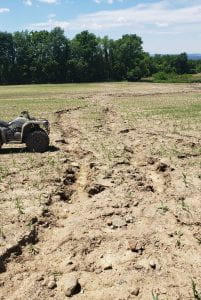Hello, my name is Bryce Schuster and I am a soon to be senior, studying agricultural science. This summer I am completing my internship at Edgewood Farms, LLC in Groveland, New York. Edgewood Farms is primarily a crop farm, but also operates a small feedlot, and is an authorized reseller of drainage tile, bunk covers and bags, fencing supplies and agricultural GPS systems. The main crops grown are corn and soybeans, however they also grow wheat, green beans, kidney beans, and black beans. The mission at Edgewood Farms, LLC is to provide quality products and service to their customers, while maintaining the integrity of the land, animals and environmental resources. My duties this summer consist mostly of crop scouting, tissue sampling, and field agronomic problem-solving.
This spring and the beginning of summer have made farming difficult to say the least here in Western New York. It has rained constantly  and been cooler than normal until a couple of weeks ago. When I started the internship at the end of May, corn planting was just getting under way. This meant all hands-on deck to get fields prepped and seed in the ground. Without any crops for me to scout this meant I also got the opportunity to assist with field work in equipment that is much larger than I am used to on my farm.
and been cooler than normal until a couple of weeks ago. When I started the internship at the end of May, corn planting was just getting under way. This meant all hands-on deck to get fields prepped and seed in the ground. Without any crops for me to scout this meant I also got the opportunity to assist with field work in equipment that is much larger than I am used to on my farm.
My first week on the job consisted of learning the names and location of over 200 fields, making up almost 4,000 acres, spread over 3 townships; and running a Case IH 9180 with a chisel plow to fill in ruts made by the farms sprayer that was applying pre-emerge herbicide. Edgewood Farms has made the transition to an almost entirely strip tillage or no-till cropping system so it is rare to see conventional tillage performed, such as chisel plowing. However, when last fall and this spring saw excessive rainfall, it is inevitable that a 35,000 lbs. sprayer with narrow tires is going to sink into the ground more than is ideal. I also got the chance to use their 40-foot-wide roller to roll fields that are planted to beans, making the ground as flat as possible to optimize yield by allowing the combine header to be run closer to the ground without risking damage by picking up a rock.
Soil erosion on a conventionally tilled corn field.
 Now that crops are finally starting to germinate and emerge, I can begin my scouting. When the crops were still in the VE stage my main focus was on taking stand counts and checking for insect damage. With all the moisture, one problem associated with strip or no-till cropping systems became apparent. While the residue on the ground from last years crop is good for soil moisture retention in dry periods and weed suppression, it also creates a great environment for slugs. I never knew slugs could do so much damage to crops and unfortunately it is not an easy problem to control. Slug bait is extremely expensive so purchasing enough to treat every field is not practical. The best way to end the problem is for things to dry out a little bit. I am looking forward to how the summer progresses and what knew things I can learn!
Now that crops are finally starting to germinate and emerge, I can begin my scouting. When the crops were still in the VE stage my main focus was on taking stand counts and checking for insect damage. With all the moisture, one problem associated with strip or no-till cropping systems became apparent. While the residue on the ground from last years crop is good for soil moisture retention in dry periods and weed suppression, it also creates a great environment for slugs. I never knew slugs could do so much damage to crops and unfortunately it is not an easy problem to control. Slug bait is extremely expensive so purchasing enough to treat every field is not practical. The best way to end the problem is for things to dry out a little bit. I am looking forward to how the summer progresses and what knew things I can learn!
Slug damage.

